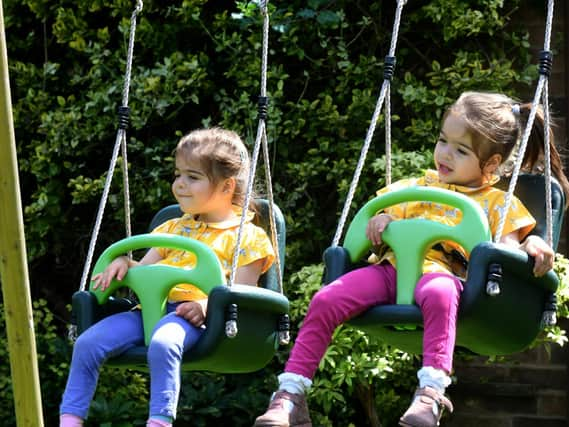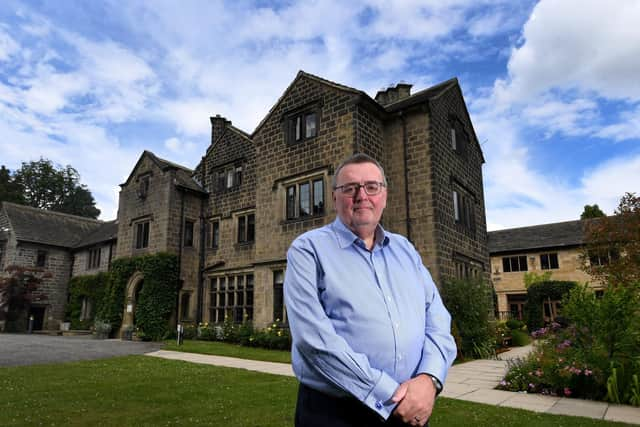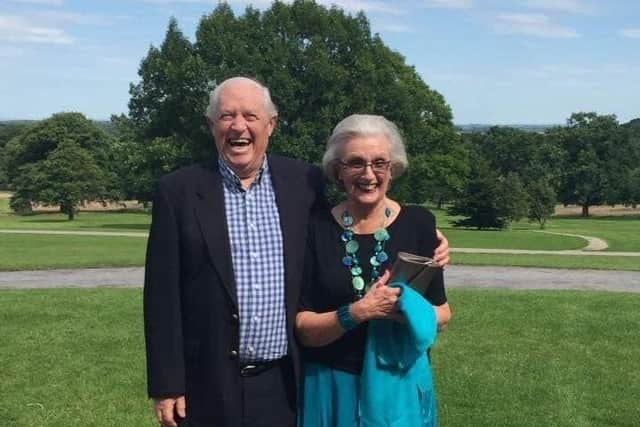Wakefield mother praises Martin House hospice for pandemic efforts as Harrogate palliative care boss warns fundraising future uncertain


The word “hospice” may have once conjured up images of hushed tones and sadness, but the reality is for many years, they have made great efforts to ensure they are as full of life as they are places to experience a peaceful death.
But the pandemic changed everything for families in need of palliative care and respite, and the challenges on hospices to continue providing their support while dealing with a fundraising gap has been enormous.
Advertisement
Hide AdAdvertisement
Hide AdLyndsey Chand and her husband Kevin have been supported for almost two years by Martin House Hospice, near Boston Spa, after their twin daughters Ruby and Sophia were diagnosed with a rare genetic condition.


The girls have alternating hemiplegia of childhood (AHC), a neurological condition that causes them to stop breathing and have fits.
Mrs Chand, 33, a secondary school teacher, and her husband Kevin, 34, turned to the hospice for support after the girls’ diagnosis, and were offered regular residential stays as a family for respite care.
She said: “I was a bit apprehensive at first. A lot of people have this impression that a hospice is where children go to die.”
Advertisement
Hide AdAdvertisement
Hide AdBut the visits to Martin House which allowed Mr and Mrs Chand time off from full-time care while the girls received expert support had given the family much needed respite.


The pandemic meant though that visits had to be amended significantly and before long the family were struggling to cope without as much support.
Mrs Chand, who lives in Wakefield said: “The hospice was on standby for children who became poorly with covid. By May, we were really struggling. The girls’ episodes were so relentless. I got to a point where we weren’t okay, and we were offered an emergency stay.
“Just being able to switch off and feel safe, as the girls were shielding. It’s so intense all the time, as when the girls aren’t well you can’t take your eyes off them for a second.”
Advertisement
Hide AdAdvertisement
Hide AdFor Mrs Chand, it’s vital that the Government steps up to support hospices after the pandemic.
“There’s lots of places where there’s gaps where NHS services are stretched. They’ve done an amazing job, but there are gaps.
“The efforts hospices have made during lockdown when a lot of agencies shut down, they’ve done everything they can.”
No one knows more about those Herculean efforts than Tony Collins, who runs both Saint Michael’s Hospice in Harrogate and Herriot Homecare, which delivers at-home care across rural areas.
Advertisement
Hide AdAdvertisement
Hide AdAt the start of the pandemic, he was faced with a dilemma as people reaching end-of-life turned more to hospices than to hospitals.
“An awful lot more people chose not to go into hospital care because of restrictions around visiting,” he remembered. “Across the board, we increased the number of people we had contact with by 120 per cent.”
In the end, the hospice joined up with Harrogate Hospital to ensure that people were able to access contact with relatives at the end-of-life.
“We were phoning relatives of people in hospitals on a regular basis for wellbeing checks. There was huge anxiety around people in hospitals from their loved ones.
Advertisement
Hide AdAdvertisement
Hide Ad“At the very beginning, we had to shut down on visiting other than the last days of life and our bed occupancy dropped to around 40 per cent.”
Demand quickly shot up as staff at Saint Michael’s adapted to allowing visitors donned in full PPE, meaning families were able to share precious last memories once again with loved ones.
But many families still have chosen instead to rely heavily on home-based hospice care, meaning staff at Herriot Homecare are providing up to 140 hours a week of care and at times driving hundreds of miles a day as they visit patients based as far away as Reeth.
Mr Collins is worried about the impact the lack of mass fundraising events over the past 18 months will have on the future of hospice finances.
Advertisement
Hide AdAdvertisement
Hide AdHe said: “We must not shy away from the fact we need further resources. There is concern on what the impact on fundraising is going to be in the future. The extra money that came through was to ensure hospices retained their capacity. We don’t know what’s going to happen.
“I think it would be wrong to say the future looks great in terms of funding.”
The changes to care in hospices were thrown into sharp focus for Fiona Pillar, whose parents both were treated at Saint Michael’s in their final days.
Her mother Shelagh O’Boyle died in 2018 of cancer and Mrs Pillar described her passing as “serene and peaceful.”
Advertisement
Hide AdAdvertisement
Hide AdMrs Pillar, 53, was able to spend as much time as she wished with her mother in the days leading up to her death, and the treatment she received persuaded her father Shaun who had also been diagnosed with terminal cancer that he wanted care from this hospice when his time came.
But as Mr O’Boyle deteriorated last summer, the family realised that his final days were at risk of feeling very different.
The social support the hospice provided Mr O’Boyle, including flower arranging and creative writing groups, were necessarily curtailed due to lockdown restrictions.
And as Mr O’Boyle’s condition worsened, a bed was found for him in the hospice.
Advertisement
Hide AdAdvertisement
Hide AdMrs Pillar said: “It was a very different situation than with mum as staff needed to mask up, put aprons on. You could barely see their eyes, but they were desperately human. They were so courteous to Dad. They had a personal bond with him.”
She is keenly aware that by being able to visit Saint Michael’s during her father’s stay, she was in a far more privileged position than many families who were forced to say goodbye virtually to dying loved ones in hospital.
“We were doing what was called barrier nursing which meant we couldn’t leave the room once we’d gone in there, but we could spend the whole day with him,” she said.
“I can’t imagine how those families felt. We were very fortunate in a very difficult situation.”